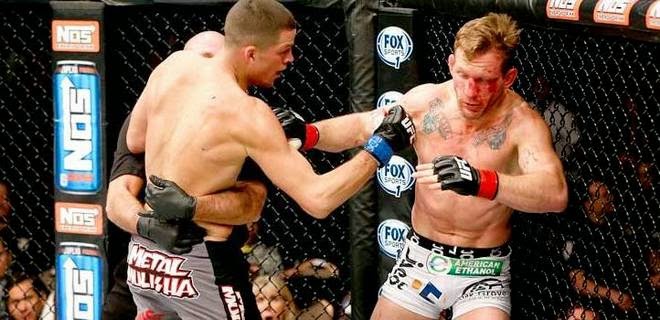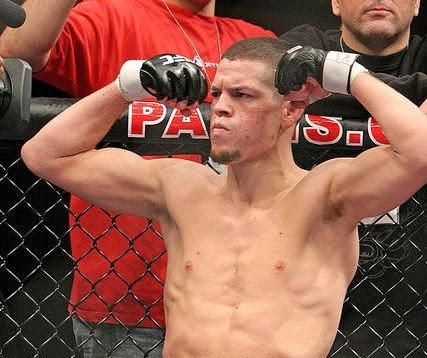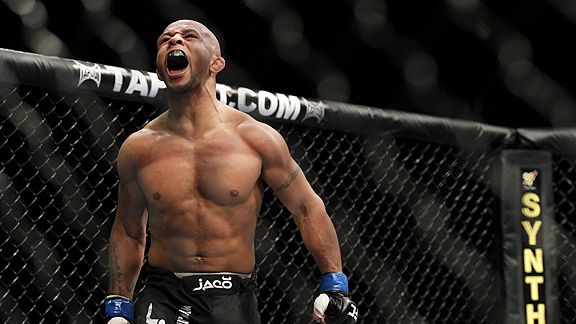The world of professional sports can be broken into two parts. The first is the action that occurs on the court, field, ring, or in the case of MMA, the cage. The other part happens outside of the competitive realm, and often involves business. One of the more captivating aspects of watching sports is seeing how players, officials, and executives react when the action outside of the field of play begins to affect what happens within the confines of competition. The Ultimate Fighting Championship is known for its fighters’ stellar performances inside of the Octagon, but when it tries to control what its fighters do outside of the cage, it only serves to highlight the differences between it and the sports leagues that we have become familiar with.
One of the main stories in the mixed martial arts world this week concerns the removal of former fifth-ranked lightweight contender Nate Diaz from the official UFC rankings. Diaz has been outspoken recently due to an ongoing conflict with the promotion over his belief that he is worth more money than he’s currently being paid. The Stockton, California native has never been shy about saying exactly what he’s feeling, and while this isn’t the first time he’s been critical of his employer, it does seem to be coming back to haunt the lightweight at this time.
 Diaz is in the midst of an eight-fight contract that he signed back in 2012, before he fought for the UFC lightweight title against Benson Henderson at UFC on Fox 5. Though he is 1-2 since then, the fighter has decided to sit out and attempt to force the UFC into renegotiating. Many experts speculate that this is due to the fact that the UFC is in dire need of stars, and Diaz knows his presence carries weight. This, along with the contract situation that his teammate Gilbert Melendez recently went through, seems to have inspired Diaz to take this hardline stance that has kept him out of action since defeating Gray Maynard at The Ultimate Fighter 18 Finale this past November.
Diaz is in the midst of an eight-fight contract that he signed back in 2012, before he fought for the UFC lightweight title against Benson Henderson at UFC on Fox 5. Though he is 1-2 since then, the fighter has decided to sit out and attempt to force the UFC into renegotiating. Many experts speculate that this is due to the fact that the UFC is in dire need of stars, and Diaz knows his presence carries weight. This, along with the contract situation that his teammate Gilbert Melendez recently went through, seems to have inspired Diaz to take this hardline stance that has kept him out of action since defeating Gray Maynard at The Ultimate Fighter 18 Finale this past November.
The UFC has gone on record in stating that he has been removed due to inactivity and an unwillingness to take fights. However, reviewing the promotion’s current rankings shows a number of fighters that have been out for an even longer period of time, such as Cat Zingano, Chan Sung Jung, and Dominick Cruz.

What makes this situation really look bad for the UFC is the fact that these rankings are supposed to be created by an impartial panel of media members. These media members use a voting system to rank the fighters on the UFC roster, but the promotion decides what to actually publish. The UFC debuted these rankings back in February of 2013, and they have been a source of controversiy ever since.
Even though this situation should be considered a “non-story” to people familiar with the inconsistencies of the UFC rankings, it continues a long-standing trend of the promotion going to great lengths to control the news that is generated about the company. The organization has a history of being very selective about who is provided media credentials to cover events, or gets interview access to requested individuals within the organization, and have been known to revoke said credentials and access as a punitive measure based on perceived unfavorable coverage.

These practices are starkly different from the way sports leagues conduct business. Imagine if the NCAA took more of a direct role in deciding bowl match-ups by circumventing the voting process that is used within the BCS rankings, and outright creating the match-ups that fans want to see. Imagine if commissioners such as Adam Silver, Roger Goodell, or Bud Selig revoked the credentials of media members in an attempt to control or punish those that cover their respective sports. However, the UFC continues to use these practices. And while it isn’t known who makes the final decision, it’s clear that the organization doesn’t take it lightly when it is covered in an undesirable fashion.
Even though Nate Diaz has requested a release from his UFC contract, it doesn’t seem like the promotion is going to grant his wish. The matchmakers know he has the drawing power to put people in the seats and in front of their televisions. If he walks away and gets a bigger deal, that may entice his brother Nick to attempt to do the same thing, and he’s an even bigger star at this moment. Diaz supposedly turned down a fight against Khabib Nurmagomedov for what has been called “financial reasons.” Removing him from the rankings may be the first step of the promotion playing hardball, and letting Diaz know that it can wait out the situation much longer than he can. And if he continues to sit out, he should expect that situation to become much worse.
There’s a business side to sports that is often overlooked due to the exciting action that happens on the field of play. The Ultimate Fighting Championship has done a strong job of ensuring that most of the media that covers the company does so in a positive light, as that tends to be good for business. However, exerting too much influence over the media will eventually blur the line between sport and sports entertainment. The UFC’s response to Nate Diaz’s contract posturing demonstrates that, regardless of what happens within the Octagon, the promotion’s approach to dealing with its fighters outside of competition will be far different from the manner that mainstream sports fans would expect.




